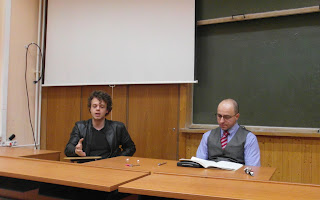by Federico Sollazzo (p.sollazzo@inwind.it)
 Abstract
Abstract
Is Critical Theory a part of our knowledge we can access just in a kind of museum of history of ideas, or is Critical Theory a living part of our culture on which we can still rely in order to understand and (re)orient our society? To answer this basic question, and many others, and also to shed some light on what seems to be a recent abuse of the term “critical”, in this issue will be addressed, under different points of view, the meaning of the expression Critical Theory.
The papers here collected are divided in an English and an Italian section, to facilitate the reader who is confident, or prefers, only one of these languages. In both sections, Critical Theory is addressed in a twofold way: as regards its origins in the so-called School of Frankfurt and as concerns its further and contemporary developments, from an interdisciplinary perspective.
Keywords: Critical Theory, Society, Philosophy, Sociology, Anthropology.
The locution Critical Theory has become increasingly widespread and influential in the last decades. If, on the one hand, it indicates a growing interest in this field, on the other, it risks to inflate this term and concept, until the point that it can mean everything and nothing. Therefore, the first task imagined for the present issue is to take stock of the meaning of the expression Critical Theory: what the/a Critical Theory is. Indeed, only after having clarified it, it is possible to move forward, investigating how a theory, eventually considered critical, can offer an interpretation and, with it, a possible orientation of society. To be close to this perspective, in this issue Critical Theory is not taken in a general, generalist and generic meaning of problematization of something (as recently often happens), but in the particular meaning it had and, notwithstanding several shadows, has in the tradition of the Institut für Sozialforschung of Frankfurt. That is to say, designating particular topics on the base of a particular background, being those topics resumable (in a kind of list of possible keywords) as: social change – and its possible subject –, capitalism, mass culture technology, instrumental rationality, alienation, repression, domination – of man over nature and man –, critique, emancipation, reason, and being that scenario nothing more and nothing less than the Western civilization.









